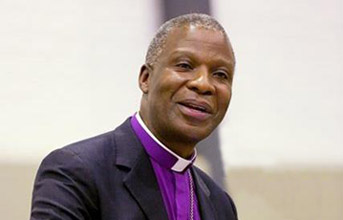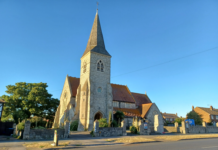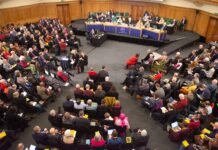Archbishop Thabo Makgoba today [17 Nov 2024] announced an inquiry into whether the Anglican Church in Cape Town has met its obligation to keep its members safe from abuse.
He was preaching in Cape Town after the publication of a report in Britain that a former UK lawyer, John Smyth, had perpetrated serious abuses in Britain and Zimbabwe in the 1980s and 1990s. Smyth attended a Cape Town Anglican Church for two periods – the first for a year or two in the early 2000s, and again in the months before his death in 2018.
Archbishop Makgoba said no evidence had ever been reported to the church’s leaders that he had committed abuses in Cape Town.
“But the diocese (of Cape Town) and I are accountable to you, our church members, and to society, to ensure that all our churches are safe spaces in which to worship and minister,” he said.
“Consequently, I am consulting the Safe and Inclusive Church Commission, which pursues abuse cases vigorously, as well as our chancellors and registrars, who give us legal advice, to work out the terms of reference of a review of whether the diocese, and I personally, met our obligation to keep you safe, and what we could have done better.”
Archbishop Makgoba said abuse in the church led to “society’s loss of trust in our integrity when we claim to work for the flourishing of all human beings.
“We cannot credibly challenge our government without ourselves living up to the standards of morality we expect from them.”
The bishop of an English diocese wrote to the Diocese of Cape Town in 2013, warning that Smyth was accused of abuse in Britain and Zimbabwe. Inquiries at the time revealed that Smyth had left the Cape Town parish he had attended a number of years earlier, and that no reports of abuse or grooming had been made. He was allowed back to worship in the parish in the months before he died, on condition he did not get involved in any ministry or contact any young person.
The relevant excerpt from Archbishop Makgoba‘s sermon follows.
[Editorial note: News reports suggesting that Archbishop Makgoba earlier rejected an inquiry are inaccurate. He was referring to the fact that no inquiry under church law into specific incidents of abuse was possible in the absence of any reports of abuse. A report saying that the Anglican Church in Zimbabwe is part of the Anglican Church of Southern Africa is also incorrect.]
Excerpt:
In the light of the scandalous abuse in England and Zimbabwe that has forced the Archbishop of Canterbury to resign, we have to ask as Anglicans in South Africa whether we have neglected “the weightier matters of the law: justice and mercy and faith.” (Matthew 23:23)
The details of the abuse perpetrated by John Smyth in the 1980s and 1990s are enough to make you sick. Archbishop Desmond Tutu used to say that no one is beyond the love of God, that no one is irredeemably evil, but I have to say that Smyth’s vicious and foul abuse of young men tests that belief.
In the church, we often accompany people at the most critical points in their lives: at the celebration of new life at baptism, celebrating their marriages, at times of work and personal crisis, and when their loved ones die. We also minister to young people at a formative time of their lives, often to teens and pre-teens from unstable or unhappy homes. For someone in the church, which is meant to be a safe and nurturing space, to prey on God’s children when they are at their most vulnerable is not only wrong, it is not only criminal, which it often is, it is evil beyond description. It makes me want to weep.
Beyond our compassion for victims of abuse, which must be our primary and overwhelming concern, the sad and horrendous cover-up revealed in the Church of England’s report on Smyth’s abuse removes the glue which holds us together in the church, and which we pride ourselves on: that glue is trust, a trust that binds communities together.
We now know that John Smyth appears to have lived in South Africa, mostly in Cape Town, from the early 2000s until his death in 2018. When the diocese (of Cape Town) received a warning in 2013 from a bishop in the Church of England about the abuses he committed before he came here, it was established that he had worshipped in one of our parishes for a year or two about eight years earlier. There was no evidence that he had abused or tried to groom anyone. In 2020, I learned that during the last months of his life, when the diocese knew of his history, he had been allowed to attend services in the same parish on condition he was not to get involved in any ministry or contact any young person.
In the absence of any evidence that Smyth had committed abuse in the relatively short periods during which he had worshipped in our church, there was no action that could be taken under our Canons (church law). Nor did we know of any crime that he committed in South Africa, whether inside or outside our church, that could be reported to police. But the diocese and I are accountable to you, our church members, and to society, to ensure that all our churches are safe spaces in which to worship and minister.
Consequently, I am consulting the Safe and Inclusive Church Commission, which pursues abuse cases vigorously, as well as our chancellors and registrars, who give us legal advice, to work out the terms of reference of a review of whether the diocese, and I personally, met our obligation to keep you safe, and what we could have done better.
We must also not be naïve – the publicity around this case will generate more reports of abuse from the past, so far unknown to the church’s leadership. The Safe and Inclusive Church Commission has re-published its contact details on the church’s website and Facebook page, and I encourage anyone who knows of abuse to report it to them.
Not only our handling of the warning in 2013, but our handling of other abuse cases going back decades, raises a serious trust issue, and as I said when we were fighting government corruption 10 years ago, low levels of trust have a high cost. In the case of abuse in the church the cost to us lies in terms of those who will lose their faith and wander away as well as society’s loss of trust in our integrity when we claim to work for the flourishing of all human beings. We cannot credibly challenge our government without ourselves living up to the standards of morality we expect from them.
The sad reality of the culture of the bad decision-making, marked by secrecy, of yesteryear, in which we hid such heinous acts, is that it has crippled us today. In the Smyth case it has led to the tragic resignation of the Archbishop of Canterbury, to “collateral damage” for others of us, and a credibility crisis for the church. Tough as this process will be, we must seize the opportunity to identify what we need to change and then to look forward and work for a new vision for tomorrow.
The Christ who has died to such sin as we have seen here, calls us sinners, warts and all, to be transformed and to seek to transform the structures of society. The question we face today is how do we move beyond mere words and deploy our shock and anger in order to be self-critical and to hear Joel afresh and “Sanctify a fast, [and] call a solemn assembly.” (Joel 1:14) How do we clean up the culture of secrecy, become more accountable, transparent, compassionate and honest in our dealings with all, particularly the vulnerable?
The Safe and Inclusive Church Commission, which deliberately operates independently of our church hierarchy, will help to guide us, and a system of referrals of the names of suspected abusers between the different autonomous churches of the worldwide Anglican Communion will be key. We can’t be like Pilate and pass the buck. We cannot bury our heads in the sand in shame and become invisible as the body of Christ. We are a Resurrection people.
As we radically reorient ourselves after this heinous and tragic episode, and move into a new reality, our culture, our leadership and our vocation must be to serve others and to demonstrate that evil and death are not the final goal.
The full text of the sermon is available on the Archbishop’s blog:



